#Transcendental Knowledge
Text
"The Initiates of the Flame: Illuminating the Path to Esoteric Wisdom"
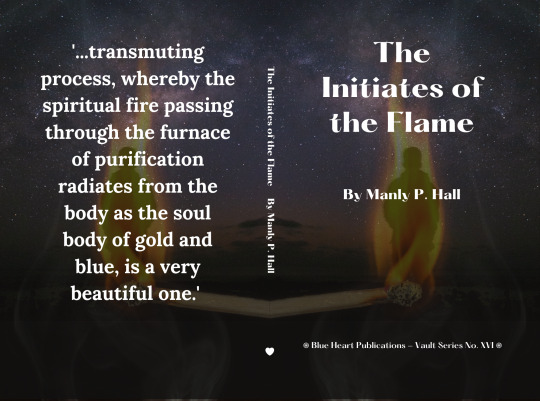
In "The Initiates of the Flame," Manly P. Hall takes readers on a captivating journey into the profound realms of esoteric knowledge and spiritual enlightenment. Hall's meticulous exploration of ancient mystical teachings serves as a beacon, guiding readers through the intricate tapestry of secret wisdom. With eloquence and depth, the author unravels the symbolic language of the initiates, revealing timeless truths that resonate with seekers of spiritual understanding.
Hall's narrative is a tapestry woven with threads of mystery, unveiling the sacred rites, hidden symbols, and spiritual allegories passed down through the ages. The book becomes a key unlocking the doors to higher consciousness, inviting readers to contemplate the esoteric principles that underpin the universe. As Hall delves into the teachings of the initiates, he sheds light on the transformative journey one must undertake to unlock the secrets of the flame—the eternal source of spiritual illumination.
The Initiates of the Flame is not merely a book; it is a profound meditation on the esoteric traditions that have shaped humanity's quest for spiritual enlightenment. Hall's insights are a testament to his deep understanding of the ancient mysteries, offering readers a glimpse into the hidden dimensions of existence. This work is a must-read for those who seek to unravel the mysteries of the flame and embark on a transformative journey toward higher knowledge and self-realization.
"The Initiates of the Flame," Manly P. Hall is available in Amazon in paperback 10.99$ and hardcover 18.99$ editions.
Number of pages: 167
Language: English
Rating: 9/10
Link of the book!
Review By: King's Cat
#Esoteric Wisdom#Spiritual Illumination#Ancient Mysteries#Initiatic Teachings#Hidden Symbols#Symbolic Language#Higher Consciousness#Spiritual Transformation#Sacred Rites#Mystical Traditions#Secret Knowledge#Spiritual Allegories#Metaphysical Exploration#Initiatory Journey#Universal Truths#Occult Wisdom#Hermetic Philosophy#Alchemical Insights#Transcendental Knowledge#Self-Realization
4 notes
·
View notes
Text
Beyond the Conceptual
Understanding Ultimate KnowingIn our journey through life, we often find ourselves entangled in the web of conceptual knowing – a realm dominated by facts, figures, and the tangible. However, there lies a deeper, more profound level of understanding, which I refer to as “ultimate knowing.” This is not just another rung on the ladder of knowledge, but rather a different dimension that transcends…
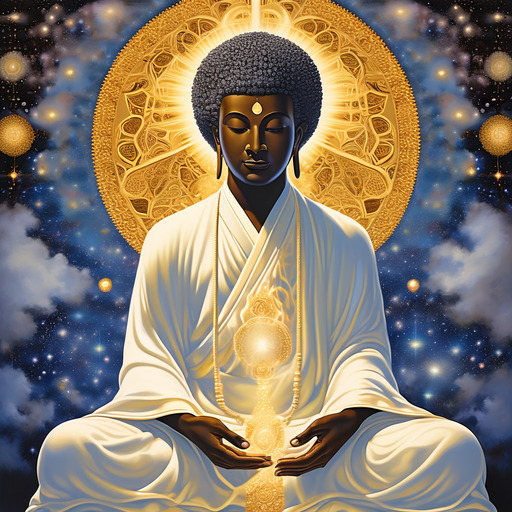
View On WordPress
#Consciousness#Holistic Understanding#Inner Wisdom#intuition#meditation#mindfulness#Personal Growth#Spiritual Awareness#Transcendental Knowledge#Ultimate Knowing
1 note
·
View note
Text
"The Initiates of the Flame: Illuminating the Path to Esoteric Wisdom"
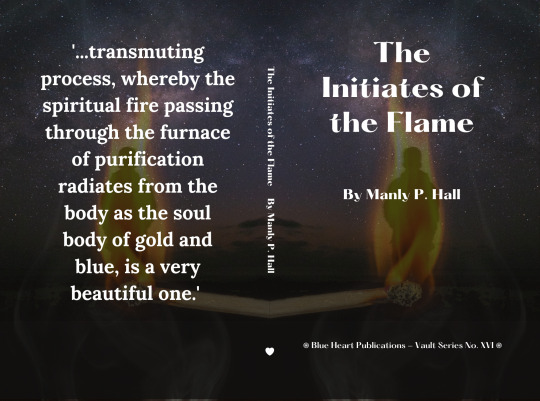
In "The Initiates of the Flame," Manly P. Hall takes readers on a captivating journey into the profound realms of esoteric knowledge and spiritual enlightenment. Hall's meticulous exploration of ancient mystical teachings serves as a beacon, guiding readers through the intricate tapestry of secret wisdom. With eloquence and depth, the author unravels the symbolic language of the initiates, revealing timeless truths that resonate with seekers of spiritual understanding.
Hall's narrative is a tapestry woven with threads of mystery, unveiling the sacred rites, hidden symbols, and spiritual allegories passed down through the ages. The book becomes a key unlocking the doors to higher consciousness, inviting readers to contemplate the esoteric principles that underpin the universe. As Hall delves into the teachings of the initiates, he sheds light on the transformative journey one must undertake to unlock the secrets of the flame—the eternal source of spiritual illumination.
The Initiates of the Flame is not merely a book; it is a profound meditation on the esoteric traditions that have shaped humanity's quest for spiritual enlightenment. Hall's insights are a testament to his deep understanding of the ancient mysteries, offering readers a glimpse into the hidden dimensions of existence. This work is a must-read for those who seek to unravel the mysteries of the flame and embark on a transformative journey toward higher knowledge and self-realization.
"The Initiates of the Flame," Manly P. Hall is available in Amazon in paperback 10.99$ and hardcover 18.99$ editions.
Number of pages: 167
Language: English
Rating: 9/10
Link of the book!
Review By: King's Cat
#Esoteric Wisdom#Spiritual Illumination#Ancient Mysteries#Initiatic Teachings#Hidden Symbols#Symbolic Language#Higher Consciousness#Spiritual Transformation#Sacred Rites#Mystical Traditions#Secret Knowledge#Spiritual Allegories#Metaphysical Exploration#Initiatory Journey#Universal Truths#Occult Wisdom#Hermetic Philosophy#Alchemical Insights#Transcendental Knowledge#Self-Realization
0 notes
Text
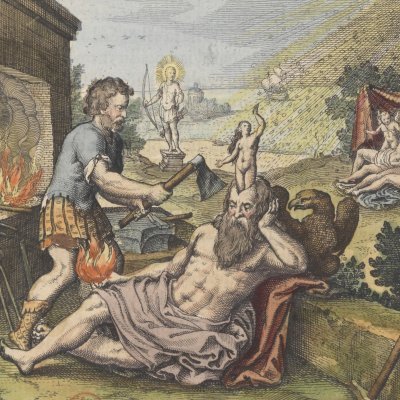
"Through the initial workings of the mind, we have the ability to conceive of a reality which beholds the essence of an ancient spirit; expressing dutiful reckonings of Being through moments which reign endless teachings." ~Mise-n-abyme
|Artwork: 'Birth of Athena', Atalanta Fugiens —Michael Maier (17h century)
#occult#esoteric#alchemy#wisdom#spirit#mysticism#self development#spirituality#words#hermeticism#ancient philosophy#writers and poets#ancient wisdom#philosophy#nonduality#duality#western esotericism#eastern philosophy#transcendental#know thyself#mystical#magick#gnosis#gnostic#law of the universe#as above so below#forgotten history#forbidden knowledge#mindbodysoul#mindbodyspirit
18 notes
·
View notes
Note
When you get into sonic vibes again I'd love to hear your ideas on Amy's hammer?
I feel like you can choose to interpret it as Amy having pocket dimension storage she keeps all sorts of things in but I personally feel like if she had that she'd use it obviously for a Lot of things, so my personal favorite take is Amy's hammer is a magical girl weapon.
Like, my gameverse-canon read is that she just, needed a weapon and hadn't prepared, so sometime during Sonic CD she just grabbed it from Little Planet, possibly Good Future, so it's this advanced magitech thing that has registered her as a user and will just materialize to her due to its command of time-space weirdness, which is why she can also duplicate it and modify its size depending on her situation. Amy herself doesn't really know how it works, and may think of it as her lucky hammer because it just always seems to be usefully what she needs, unaware that it may have a simplistic AI and be learning and evolving from her usage habits.
I definitely like the take it's actually really dang heavy, like she could barely swing it in Sonic CD and came off that and went "well, that was embarrassing!" and worked out heavily. I mean, her hammer jumps in Adventure imply that it's heavy enough to offset her entire body weight if she swings it quickly.
#Sonic the Hedgehog#Amy Rose#piko piko hammer#like Amy as a character tends to come off pretty spiritual#of the 'classic four' she's second only to Knuckles in terms of that sense of mysticism#she reads fortunes and talks about her intuition (which is uncannily good)#so I feel like the hammer definitely is something a little transcendental that she picked up / doesn't have full control or knowledge over#but she's able to work well with it in spite of that unknowing-ness; it's more fly-by-feel#and the thing about her 'lighter' hammer in the murder game#is because she's figured out how to manipulate the properties of her hammer's paradox clones
60 notes
·
View notes
Note
thought about zed gender and then about gender wanted to ask if you have advice or tips for someone who is non binary but unsure what pronouns to use?
My advice will always be don't worry about it that much. I've been NB for a long time and I've never had a pronoun used on me that's clouds parting, trumpets blaring kind of revelation. I don't think it matters all that much—to me that is. Obviously if someone does have the trumpets blaring that deserves respect (and the inverse, if there's pronouns that make you devil hell-barf then that decision should be respected as well), but I think if you're hanging out in the meh zone and not really having the big breakthroughs that we expect from coming out media, don't push yourself.
Just vibe, try new ones, discard old ones, and remember that pronouns are not the be-all-end-all and some people are using them for convenience sake rather than any kind of gender euphoria. you can also consider other things: titles like ms miss mr mx, gendered nouns like prince princess, girl boy kid; presentation, the way you're dressed and perceived; even shit like your voice or whatever. pronouns are a convenient lingual slice of the gender pie and you can just plop that down on a paper plate and send it down the line if you want to. cis people aren't getting giddy about their own pronouns (hell some have forced themselves to forget what a pronoun is, because they're dumb) so I think it stands to reason that while it might be a nice feeling, it's not one we HAVE to have in order to party.
Find what makes you feel good and chase it, find what makes you feel bad and avoid it, and if something isn't doing much of anything then whatever, fuck it.
#talkForge#fuck it we ball etc etc#sorry if this isn't very useful I'm pretty blase about it#I'm a real 'i dont care about any transcendental knowledge of the self through recognition of the other#i just dont want anyone in my business' type I think if I hung around people that cared about that kind of thing as obsessively#as I've seen floating around I'd have a perma headache
24 notes
·
View notes
Text
detachment

sun in aquarius : sidereal
The concept of d e t a c h m e n t is a core spiritual principle practiced in various contemplative traditions, including Buddhism, Hinduism, Taoism, and Stoicism. Detachment refers to the idea of liberating the ‘Being of Self’ from earthen attachments and desires in order to create space for inner peace, contentment, and spiritual fulfillment to thrive. As we move through life, we may find ourselves attached to certain people, possessions, or ideas. These attachments can consume and overwhelm us, blurring the lines between ‘Identity’ and ‘Creation’. When our identities become obscured by our creations, we lose touch with our ‘Divine Natures’ – the essence of our personal power. The spiritual practice of detachment facilitates a regular releasing of these attachments that bind our energies to the limitations of the tangible world, allowing for the embodiment of flow states that are necessary for harmony, abundance, and transcendence.
Detachment is often misunderstood as a rejection of the world and a withdrawal from one’s daily activities and responsibilities. The misconception arises from the attribution of apathy. While apathy is a disparity in one’s emotional connection with the surrounding world, detachment is intrinsically a state of emotional balance and strength that arises from a profound acceptance of the ‘Impermanence of Existence’. Thus, detachment is not a means to avoid, abandon, or neglect the world and its physical realities, but rather, it encourages the awareness of the ‘Moving Nature’ of the ‘Present’ and inspires a joy and empowerment for the freedom that impermanence allows.
The Season of Aquarius is the ‘kairos’ time – the seasonally appropriate time – to focus on the spiritual practice of detachment. Much like there are appropriate seasons for sowing and reaping, the Sun’s position in the constellation of Aquarius guides one to the relevant and spiritual lessons that require cultivating. Aquarius is the sign of the zodiac that represents innovation, originality, and independence, which are the traits that are birthed from a mastery in detachment and ascension, the two main spiritual disciplines of the Aquarius season. Those born under the sign of Aquarius are often seen as free-spirited individuals who are unafraid to challenge the rules of reality, move beyond assumed and conventional ways of life, and forge eccentric pathways forward. Aquarians pioneer the exploration of new experiences and ideas, with a cosmic perspective on the worldview.
introspection prompts
What does detachment mean to me and why is it important in my life?
In what areas of my life do I struggle with detachment? What are the underlying reasons for this struggle?
How does my attachment to people, possessions, or situations affect my emotional and mental well-being, and my overall quality of life?
What are some practical steps I can take to cultivate a greater sense of detachment in my life?
How do my beliefs, values, and spiritual practices influence my understanding and practice of detachment?
notes
The lesson of ‘detachment’ will continue in another post. The lesson of ‘ascension’ will be coming soon as well, also in another post. Please subscribe to stay in the loop for updates. If you resonate with my work and find it helpful, or have any questions, please leave a comment. If you would like to support my work, I accept (and love) coffee donations. Buy me a coffee here!
#divination#spirituality#detachment#aquarius#sidereal astrology#mystic messenger#astrology#zodiac#spiritual vibrations#spiritual knowledge#spiritualpath#spiritualjourney#spiritualawakening#spiritualgrowth#cosmos#cosmology#theosophy#transcendentalism#ascension#self improvement#energy#high vibration
2 notes
·
View notes
Text
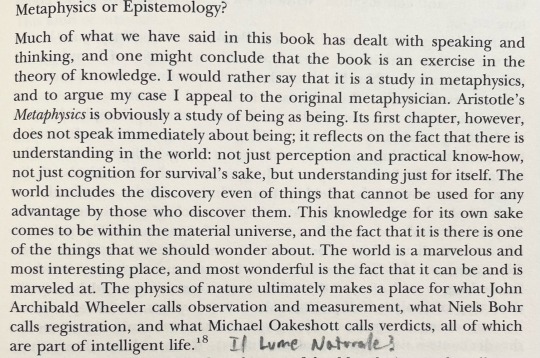
Robert Sokolowski, Phenomenology of the Human Person
16 notes
·
View notes
Text
"To enter a faerian drama; free mind"

0 notes
Text
.
#the application of knowledge is transcendental. I think that's what I'm trying to say with my 'tumblr degree' jokes#learning so much on this website is cool. but the penultimate gift is when I'm able to apply that knowledge in relationships with others#being able to share the knowledge that's helped me accept and love myself#being able to silence someone else's demons with the tools I've learned here#being able to see someone in the same pattern of hurt as I've seen discussed online and being able to face it down#it's such a powerful experience.#tag talk
1 note
·
View note
Text
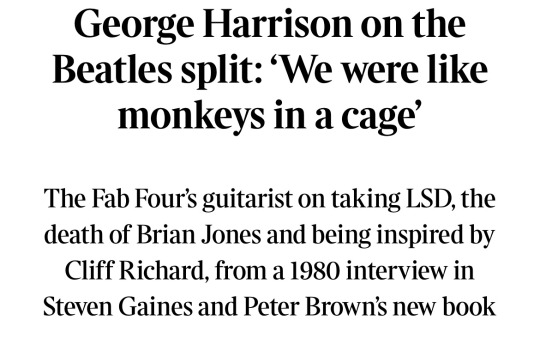
George Harrison remained an enigma to many people, even those who were close to him. For a man who lectured passionately about karma and the meaning of existence, he seemed self-protective and closed off. Witty when called upon, there were also moments when he could be quite boorish. Perhaps it was because he was only twenty years old when the Beatles became a global sensation. That might not seem particularly young in today’s world of social media fame, but at the time, it was uncharted territory for the kind of adulation he was experiencing.
It was also difficult living in the shadow of Paul and John. In the beginning, they were openly dismissive of him. Paul said he always thought of George as a little brother. At first, John pretended not to know his name and sardonically referred to him as “that kid’’. Ironically, one of George’s compositions, Something, became the most covered song in the Beatles catalogue.
This interview was conducted at George Harrison’s palatial home, Friar Park, in Henley-on-Thames, on November 5, 1980. George was gracious but cool. He made a pot of tea in the drafty, vast kitchen of his 120-room estate, and spent two hours lecturing about Transcendental Meditation and the details of a limited edition of his autobiography, I Me Mine, which is certainly how he must have felt getting out on his own.
In 2000, George was diagnosed with oropharyngeal cancer. George died on November 29, 2001, in the company of his wife, Olivia; his son, Dhani; musician Ravi Shankar; and Hare Krishna devotees who chanted verses from the Bhagavad Gita. He was 58 years old and left nearly $100 million in his will. George told Olivia that he didn’t want to be remembered for being a Beatle, he wanted to be remembered for being a good gardener.
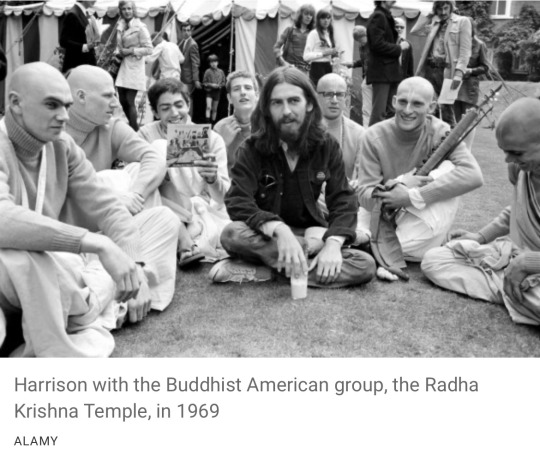
‘It was a transcendental experience that was beyond the mind’
On taking LSD
LSD was just such a violent, big experience. Before it I was totally ignorant, and afterward I knew I was totally ignorant and I was now on my way to having some sort of knowledge. I related it to the childhood experience of Catholicism and going to church on a Sunday and seeing all that phoney baloney. The moment I’d taken LSD, it just made me laugh because I understood it inside, just in a flash. I understood what the whole concept of God or religion was just by seeing it. I could see it in the grass in the trees.
It was an absolute truth; like a light going ching. I took three very powerful trips — big, very important — and then it left me a bit unsure because I had to try and figure something out. By that time I had gotten into Indian music and spent time in India, [and] there was so much about it that felt like home to me. Not the surface that you see — all this poverty and the flies and the shit everywhere — [it] went beyond all that. Smells in the atmosphere and the people’s attitude and the music, the food, the religion, everything about it … home.
‘I’d hear his voice wailing at five in the morning’
On the death of Brian Jones of the Rolling Stones
I liked Brian a lot, and later on, I realised it was probably because we were both Pisces. We both had similar natures. He was also similar in that he had a Keith and a Mick, whereas I had a John and a Paul. We both had that problem of two mighty egos to deal with in order just to try and survive. I was very susceptible to dope, and Brian [Jones] was even more susceptible. He’d come [to my house], and I’d just hear his voice wailing at like five in the morning: “George, Geeooorrgggeeee.” So I’d wake up, see what was going on, and I’d look out the window, and he’d be all white and just shattered walking around the garden — just looking for somewhere to be.
I would always meet him at that time of day and just try to calm him down. And I saw him a lot before he died in that sort of circumstance. The last time I saw him, I think, was when I’d been in hospital to have my tonsils out and he came to see me in hospital and the next week he was gone. He was like all of them who kicked the bucket — it was sad because there were too many pressures, really. Not just the pressure of being famous and having the press hounding you day and night and young fans hounding you day and night. Plus the drugs hounding you day and night.
‘F*** it — I could do better than that’
On his childhood inspiration, Cliff Richard
I remember being a kid of about twelve, dreaming of big motorboats and tropical islands and things which had nothing to do with Liverpool, which was dark and cold. I remember going to see Cliff Richard and thinking, f*** it — I could do better than that.
‘I think being Elvis was lonelier than being one of the Fab Four’
On fame — and Elvis Presley
We kept realising we were getting bigger and bigger until we all realised we couldn’t go anywhere —you couldn’t pick up a paper or turn on a radio or TV without seeing yourself. I mean, it became too much. We became trapped, and that’s why it had to end, is what I think … We were like monkeys in a cage. I think it was helped a bit by the fact that it was four of us, who shared the experience. I mean, there was more than four of us, there was Peter Brown and Brian Epstein, but there was only four of us who were actually the Fab Four — whereas Elvis had an entourage and maybe 15 guys, friends of his, but there was only one man having that experience of what it was like to be Elvis Presley. I think that was far lonelier than being one of the Fab Four because at least we could keep each other laughing or crying or whatever we did to each other. It was definitely an asset being in a group.
(source)
121 notes
·
View notes
Text
"Unveiling the Arcane Tapestry: A Journey Through 'The History of Magic' by Éliphas Lévi"
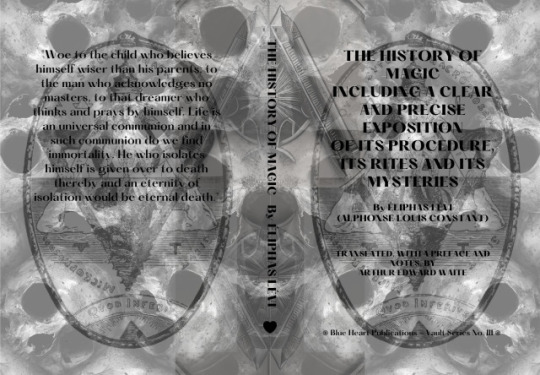
Éliphas Lévi's "The History of Magic," skillfully translated by Arthur Edward Waite, stands as a profound exploration into the mystic realms of human knowledge. With a comprehensive blend of historical insight, ritualistic precision, and esoteric mysteries, Lévi takes readers on an enchanting odyssey through the labyrinthine corridors of magical practices.
Lévi's work delves into the historical roots of magic, unraveling its multifaceted procedures, rites, and enigmatic mysteries. Waite's translation ensures that the essence and nuances of Lévi's original French text are preserved, allowing readers to grasp the intricate details of magical traditions.
The narrative unfolds like a sacred scroll, unveiling the evolution of magical practices from ancient civilizations to the contemporary era. Lévi's keen observations and scholarly approach provide readers with a deep understanding of the philosophical and symbolic foundations that underpin magical arts.
Central to the book is the exploration of the human connection with the mystical forces that shape our reality. Lévi delves into the psychological and spiritual aspects of magic, emphasizing its transformative potential for individuals seeking a higher understanding of themselves and the universe.
Waite's translation enhances the accessibility of Lévi's complex ideas, making this work a valuable resource for both seasoned practitioners and those new to the realms of magic. The prose, though steeped in profound concepts, is presented in a manner that invites readers to contemplate and assimilate the wisdom imparted.
"The History of Magic" transcends the conventional boundaries of historical texts, emerging as a timeless guide for seekers of knowledge and wisdom. Lévi's vision, masterfully conveyed through Waite's translation, invites readers to embark on a journey of self-discovery and enlightenment, unlocking the secrets that lie within the intricate tapestry of magical history.
Éliphas Lévi's "The History of Magic," skillfully translated by Arthur Edward Waite is available in Amazon in paperback 18.99$ and hardcover 25.99$ editions.
Number of pages: 497
Language: English
Rating: 10/10
Link of the book!
Review By: King's Cat
#Éliphas Lévi#Arthur Edward Waite#History of Magic#Esoteric Knowledge#Mystical Traditions#Rituals and Rites#Magical Practices#Occult Wisdom#Spiritual Enlightenment#Symbolism in Magic#Transcendentalism#Hermeticism#Alchemy#Ancient Mysteries#Sacred Texts#Ritualistic Procedures#Symbolic Interpretation#Magical Philosophy#Mysticism Unveiled#Magical Evolution#Transformation of Consciousness#Ancient Civilizations#Secret Societies#Alchemical Mysteries#Spiritual Alchemy#Psychic Development#Esoteric Symbolism#Human Connection with Mystical Forces#Theosophy#Illumination
5 notes
·
View notes
Text
Solar Return Neptune House Placements
Solar Return Neptune in the 1st House:
Theme: Self-Exploration and Idealistic Identity. This year emphasizes the importance of self-exploration and the pursuit of an idealistic identity, encouraging you to delve into your dreams and aspirations and foster a sense of spiritual connection with your inner self.
Solar Return Neptune in the 2nd House:
Theme: Financial Imagination and Material Harmony. This year highlights the significance of infusing your financial endeavors with creative imagination and seeking material harmony that aligns with your spiritual values and aspirations.
Solar Return Neptune in the 3rd House:
Theme: Imaginative Communication and Intuitive Learning. This year encourages you to communicate with an imaginative flair and embrace intuitive learning methods, fostering a deeper understanding of the world around you and nurturing your creative intellect.
Solar Return Neptune in the 4th House:
Theme: Emotional Sanctuary and Intuitive Healing. This year emphasizes the importance of creating an emotional sanctuary within your home and family life, encouraging intuitive healing practices and fostering a sense of spiritual security and solace.
Solar Return Neptune in the 5th House:
Theme: Creative Inspiration and Spiritual Expression. This year highlights the significance of channeling creative inspiration and embracing spiritual expression, encouraging you to infuse your artistic pursuits with a sense of divine connection and imaginative depth.
Solar Return Neptune in the 6th House:
Theme: Healing Service and Compassionate Work. This year encourages you to engage in healing service and compassionate work that stems from a place of spiritual understanding, fostering a sense of empathy and selfless dedication in your daily routines.
Solar Return Neptune in the 7th House:
Theme: Spiritual Partnership and Compassionate Connection. This year emphasizes the significance of fostering spiritual partnerships and cultivating compassionate connections with others, encouraging you to seek a deeper understanding and emotional harmony within your relationships.
Solar Return Neptune in the 8th House:
Theme: Transformative Depth and Intuitive Insight. This year highlights the potential for transformative experiences and intuitive insights, encouraging you to embrace the depths of your subconscious and harness your inner wisdom for profound personal growth and healing.
Solar Return Neptune in the 9th House:
Theme: Philosophical Quest and Mystical Exploration. This year encourages you to embark on a philosophical quest and engage in mystical exploration, fostering a sense of spiritual connection and open-minded curiosity in your pursuit of higher knowledge.
Solar Return Neptune in the 10th House:
Theme: Spiritual Vocation and Divine Calling. This year emphasizes the significance of embracing a spiritual vocation and answering your divine calling, encouraging you to align your career path with your soul's purpose and foster a sense of spiritual fulfillment in your professional endeavors.
Solar Return Neptune in the 11th House:
Theme: Humanitarian Vision and Collective Empathy. This year highlights the importance of embracing a humanitarian vision and cultivating collective empathy, encouraging you to contribute to the betterment of society and promote a sense of unity and compassion within your social circles.
Solar Return Neptune in the 12th House:
Theme: Spiritual Retreat and Transcendental Connection. This year emphasizes the significance of seeking spiritual retreat and cultivating a transcendental connection with the divine, encouraging you to embrace introspective reflection and foster a deep sense of spiritual enlightenment and universal love.
321 notes
·
View notes
Text
Delving into Kantian Philosophy: A Review of "The Critique of Pure Reason" by Immanuel Kant

Immanuel Kant's "The Critique of Pure Reason" stands as one of the most influential and enduring works in the history of philosophy, reshaping the landscape of metaphysics, epistemology, and the philosophy of mind. Published in 1781, this monumental treatise seeks to provide a comprehensive account of the nature, scope, and limits of human knowledge, offering profound insights into the nature of reality, the structure of the mind, and the conditions of possibility for knowledge.
At the heart of "The Critique of Pure Reason" is Kant's revolutionary concept of transcendental idealism, which posits that the mind plays an active role in shaping our experience of the world. Kant argues that the mind imposes certain fundamental concepts and categories—such as space, time, and causality—on our sensory perceptions, organizing them into a coherent and intelligible framework. Through his rigorous analysis, Kant seeks to uncover the a priori conditions that make experience possible, shedding light on the fundamental structures of human cognition.
One of the key themes of "The Critique of Pure Reason" is Kant's distinction between phenomena and noumena, or appearances and things-in-themselves. Kant argues that while we can only know phenomena as they appear to us through the filter of our cognitive faculties, there exists a realm of noumena that lies beyond the reach of human knowledge. This distinction has profound implications for Kant's philosophy, shaping his views on the limits of human understanding and the nature of metaphysical inquiry.
Moreover, "The Critique of Pure Reason" is notable for its meticulous analysis of the nature of space, time, and causality, which Kant identifies as the fundamental categories of human thought. Kant argues that these categories are not derived from experience, but rather constitute the necessary framework through which we interpret our sensory perceptions. By elucidating the synthetic a priori nature of these categories, Kant lays the groundwork for his transcendental idealism and challenges traditional empiricist and rationalist accounts of knowledge.
In addition to its groundbreaking philosophical insights, "The Critique of Pure Reason" is also celebrated for its rigorous methodology and systematic approach to philosophical inquiry. Kant's meticulous argumentation, intricate terminology, and careful exposition of concepts make "The Critique of Pure Reason" a challenging but rewarding read for scholars and philosophers alike. Kant's influence extends far beyond the boundaries of philosophy, shaping the development of disciplines such as psychology, physics, and linguistics, and leaving an indelible mark on the intellectual landscape of the modern world.
In conclusion, "The Critique of Pure Reason" by Immanuel Kant is a towering achievement in the history of philosophy, offering profound insights into the nature of human knowledge, the structure of the mind, and the limits of metaphysical inquiry. Kant's rigorous analysis, groundbreaking concepts, and systematic approach to philosophical inquiry make "The Critique of Pure Reason" a timeless classic that continues to inspire and challenge readers with its depth, complexity, and intellectual rigor.
Immanuel Kant's "The Critique of Pure Reason" is available in Amazon in paperback 24.99$ and hardcover 31.99$ editions.
Number of pages: 516
Language: English
Rating: 10/10
Link of the book!
Review By: King's Cat
#Immanuel Kant#Critique of Pure Reason#Transcendental idealism#Phenomena#Noumena#A priori knowledge#Metaphysics#Epistemology#Synthetic a priori judgments#Space#Time#Causality#Categories of understanding#Rationalism#Empiricism#Skepticism#Transcendental deduction#Transcendental aesthetics#Transcendental logic#Analytic judgments#Synthetic judgments#Appearances#Things-in-themselves#Transcendental unity of apperception#Unity of consciousness#Schematism#Idealism#Rationalist philosophy#Epistemological inquiry#Metaphysical inquiry
0 notes
Text

"True success is found in those whom have experienced life, yet still retained within them their childlike innocence."
~Mise-n-abyme
|Artwork: 'Wonder' – Alex Grey, 1996
#occult#wisdom#mysticism#words#alchemy#esoteric#spirit#self development#hermeticism#spirituality#curiosity#philosophy#initiation#mystical#magick#forbidden knowledge#free spirit#transcendental#know thyself#dark night of the soul#tribulation#mindbodysoul#mindbodyspirit#inspiration#look within#writers and poets#ancient wisdom#life lessons#divine life#poetry
122 notes
·
View notes
Note
i saw ur response to the unconscious/conscious as supposedly “divided spectrums” and it got me rotating ol homoerotic duo deleuze-guattari's great anti-oedipus (and mil platôs too, for one). i tried searching up if u had written on it but couldn't find anything at all – wld love to hear some thoughts. any of your thoughts about it akshually. peace
hah anti-oedipus was my first foray into psych-critical scholarship way back in the day :')
my position on psychoanalysis has evolved a lot since then and i think most noticeably in the sense that i've become a lot more interested in historicising it and less interested in haggling over its scientificity or whatever---ie, the question to me isn't so much "is mommy-daddy-me an intrinsically organising principle of human psychology" (obviously not) but more "what are the conditions that allow the claim to be credibly made that it is?" which is i guess to say that, like, in some ways the less insightful part of a text like anti-oedipus is always going to be the assertion that the current ruling ontology isn't a transcendentally necessary one---like, of course it isn't, lol, and the analysis here would be so productively served if deleuze and guattari had a serious engagement with historical thinking; deleuze at his best is on par with like foucault as far as historicity goes.
i think the model that anti-oedipus proffers of a broadly schizophrenic operating logic of capital has some explanatory utility but i don't think that's equivalent to forming a foundation for liberatory political action. i find deleuze generally at his most interesting where he takes up the claim that the desire for one's own oppression is not just a matter of a kind of socratic lack of (self-)knowledge and is instead a genuine expression of desire under capitalism and its familialism. but for as much as this part of the argument wants to build off reich, it's also a place where the text is noticeably not building off a historical-material analysis and instead has a really unhelpful unproductive tendency to tell a psychological myth of desire as an intrinsically revolutionary force and capitalism as motivated by the need to constrain it. so again this is, at best, just not a foundation for liberatory action because it's not historically or materially grounded.
i really adored deleuze and guattari when i first read them and i would still say that anti-oedipus and a thousand plateaus changed a lot about how i thought and read. but also these days i would honestly throw in for reich or like any other frankfurt freudo-marxist over most deleuze, lol
55 notes
·
View notes